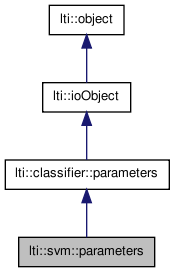

|
latest version v1.9 - last update 10 Apr 2010 |
|
the parameters for the class svm More...
#include <ltiSVM.h>


Public Member Functions | |
| parameters () | |
| parameters (const parameters &other) | |
| virtual | ~parameters () |
| const char * | getTypeName () const |
| parameters & | copy (const parameters &other) |
| parameters & | operator= (const parameters &other) |
| virtual classifier::parameters * | clone () const |
| void | setKernel (const kernelFunctor< double > &k) |
| void | attachKernel (kernelFunctor< double > *k) |
| void | useExternalKernel (kernelFunctor< double > *k) |
| kernelFunctor< double > * | createKernel (const std::string &name) const |
| virtual bool | write (ioHandler &handler, const bool complete=true) const |
| virtual bool | read (ioHandler &handler, const bool complete=true) |
Public Attributes | |
| int | nSupport |
| double | C |
| kernelFunctor< double > * | kernel |
| double | bias |
| double | tolerance |
| double | epsilon |
| bool | sumToOne |
| bool | normalizeData |
| bool | usePairwise |
the parameters for the class svm
| lti::svm::parameters::parameters | ( | ) |
default constructor
Reimplemented from lti::classifier::parameters.
| lti::svm::parameters::parameters | ( | const parameters & | other | ) |
copy constructor
| other | the parameters object to be copied |
| virtual lti::svm::parameters::~parameters | ( | ) | [virtual] |
destructor
Reimplemented from lti::classifier::parameters.
| void lti::svm::parameters::attachKernel | ( | kernelFunctor< double > * | k | ) |
Sets a new kernel function.
The kernel which is passed here as an argument must have been allocated with new; it must not be a local variable. On destruction of the parameters object, the kernel will be deleted, i.e. this parameters instance will be responsible for the memory managment of the object.
| virtual classifier::parameters* lti::svm::parameters::clone | ( | ) | const [virtual] |
returns a pointer to a clone of the parameters
Reimplemented from lti::classifier::parameters.
| parameters& lti::svm::parameters::copy | ( | const parameters & | other | ) |
copy the contents of a parameters object
| other | the parameters object to be copied |
| kernelFunctor<double>* lti::svm::parameters::createKernel | ( | const std::string & | name | ) | const |
create a new kernel function, using its class name.
A pointer to the kernel function is returned, so that the caller may modify the kernel's parameters.
| const char* lti::svm::parameters::getTypeName | ( | ) | const [virtual] |
returns name of this type.
Reimplemented from lti::classifier::parameters.
| parameters& lti::svm::parameters::operator= | ( | const parameters & | other | ) |
copy the contents of a parameters object
| other | the parameters object to be copied |
| virtual bool lti::svm::parameters::read | ( | ioHandler & | handler, | |
| const bool | complete = true | |||
| ) | [virtual] |
read the parameters from the given ioHandler
| handler | the ioHandler to be used | |
| complete | if true (the default) the enclosing begin/end will be also written, otherwise only the data block will be written. |
Reimplemented from lti::classifier::parameters.
| void lti::svm::parameters::setKernel | ( | const kernelFunctor< double > & | k | ) |
Sets a new kernel function.
A copy of the kernel will be done (so it is useless to change the parameters of the given kernel instance, because the internal kernel will never notice the changes done to its "parent").
| void lti::svm::parameters::useExternalKernel | ( | kernelFunctor< double > * | k | ) |
Sets a new kernel function.
The kernel which is passed here as an argument is not deleted by the parameters object, the caller must ensure that there are no memory leaks.
| virtual bool lti::svm::parameters::write | ( | ioHandler & | handler, | |
| const bool | complete = true | |||
| ) | const [virtual] |
write the parameters in the given ioHandler
| handler | the ioHandler to be used | |
| complete | if true (the default) the enclosing begin/end will be also written, otherwise only the data block will be written. |
Reimplemented from lti::classifier::parameters.
| double lti::svm::parameters::bias |
The initial threshold of the SVM.
Default value: 1
| double lti::svm::parameters::C |
The "C" parameter.
The meaning is explained in the standard SVM literature; the boiled down version is that C controls the generalization ability of the SVM. The larger C, the more accurate the recognition on the training set. On the other hand, the generalization performance is better with a smaller C.
Default value: 1
Epsilon for detecting change in alpha value.
Default value: 1e-12
The kernel function.
Try to use the kernel setting methods in order to ensure a consistent memory managment of the pointed instance.
Default value: "linearKernel"
If this flag is true, the training data are normalized to mean zero and variance one before training the svm.
This means that a copy of the training data is required. The transformation is stored and also used for testing. However, it is essential for SVM training that the data have low magnitudes. If the data have a variance of 100, the training simply may fail. The default value is false.
The number of support vectors that must be used.
Default value: 0
Is true if the result should be normalized to sum 1.
Default value: false
The tolerance for detecting a violation of the KKT conditions.
Default value: 1e-3
The normal SVM algorithm uses a one-against-all scheme for multi-class classification.
However, as is pointed out in ..., this is suboptimal in some cases. Therefore, you can use a combination of one-against-one classifiers (n*(n-1)/2 for n classes). Default: false.